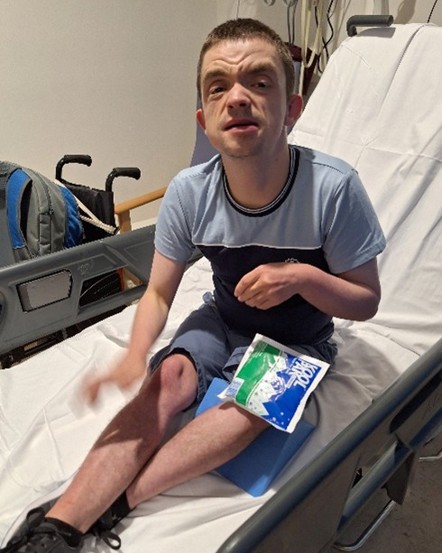Inclusion Champions – Transforming children’s and youth work

Mark Arnold
Mark heads up Urban Saints pioneering additional needs ministry programme and is co-founder of the ‘Additional Needs Alliance’, a learning and support...
There are many ways that those involved in children’s and youth work can make a big difference for children and young people with additional needs or disabilities, and their families.
I often get asked what one change can make the most difference, can have the greatest impact, can enable lasting transformation.
The answer I always give is this… have someone that owns this, that champions it, that challenges the rest of the team to step up and make a difference.
It’s not just about inclusion; so often children’s and youth groups and activities feel that if a child or young person with additional needs or disability is able to access the group then the inclusion box can be ticked.
It is so much more than this, as to settle for inclusion could just mean settling for offering a child-minding service, and there is much, much more that the group can, and should do.
Having an ‘Inclusion Champion’ can help groups to develop three important steps for their work with all children and young people, including those with additional needs or disability:
Three important steps
• Inclusion: This is still important and needs to be a foundation stone for everything else. Looking to ensure that everything the group offers is accessible to all, inclusive of all, accommodating the needs of all.
An ‘Inclusion Champion’ can be vital here to ensure that the programme the group provides is assessed against the needs of everyone. What parts of the programme might be difficult for some to access? Are there certain activities that are inaccessible to some? What simple changes and adaptations can be made to change this so that everyone is welcome, everyone can take part, everyone’s needs are considered and acted upon.
• Belonging: Inclusion is just the first, important, step. If we stop there, we settle for so much less than is possible, so much less than we should. Within children’s and youth work we risk just settling for child-minding. But do those children and young people really feel that they belong to the group; that it is their group?
Are they missed, for all the right reasons, when they can’t come? Is what they bring to the group valued and cherished, bringing a flavour to the group that is distinctive and vibrant? An ‘Inclusion Champion’ can work with the other leaders, the children and young people themselves, as well as parents and carers, to create a place of belonging for all, where everyone is valued.
• Developing: Even belonging isn’t the end of the journey; while it’s great to reach a place where all children and young people feel fully valued within their group, there is even more that can be done.
Every child or young person, whether they have additional needs or not, can develop and grow within the group and should be helped to do so. An ‘Inclusion Champion’ can enable children’s and youth workers to consider how to help everyone to grow and develop.
Where an ‘Inclusion Champion’ is in place, the impact across the work of the group is transforming.
Time and time again I come across stories from groups that have been involved in some of the training I run, which highlights having an ‘Inclusion Champion’ or ‘Inclusion Leader’ as the most important step, and are now seeing amazing results from having someone in this role.
An ‘Inclusion Champion’s story’
Claire from Zeo Church in Hitchin sums up their experience here:
“One of the ‘Top Tips’ which is shared in the training is for every group to appoint a SENCO/Inclusion Leader. I was challenged by this fantastic suggestion and took on the voluntary role of Inclusion Leader at Zeo Church. This is such an exciting opportunity and so far, together with the Children’s Pastor, we have made significant changes and made a great start in helping our children’s groups to be more inclusive and accommodating for children and young people with additional needs.
In my role as Inclusion Leader I also led a seminar at a training event for children and young people on the subject of including children with additional needs in a church setting.”
A mum’s story
Beckie is mum to a child with additional needs who attends St. Paul’s Church in St. Albans; here she speaks about the difference having an ‘Inclusion Champion’ has made for her and her family:
“I wanted to write to say how important the SEN inclusion at St Paul's has been for us as a family. I understand that the inclusion that there is now at St Paul’s stemmed from a course that members/staff from the church attended. I understand that this encouraged the creation of an ‘Inclusion Officer’ role at church and a whole host of other practical measures that support inclusion of SEN families.
Life with a child with SEN can be very isolating and there are few places in which, at times, it is possible to feel comfortable and welcomed
. Some of the things that were implemented at St Paul's include Makaton signing in family services; a space for those with additional needs to be during the service; a one-to-one helper provided for those children that need it; Makaton training for the children's leaders; visual time tables for the service timetable etc.
These steps have helped us as a family to feel welcomed and included in the church. The fact that the church has implemented these steps portrays a strong message that those with SEN are welcome, and that means they are welcomed with all the potential behavioural and emotional issues that that may bring. It also has helped our other daughter who does not have special needs. Her seeing the Makaton in the services has normalised the use of the signs for her and we think helps her not to feel like we are a different family.
If we had not felt so comfortable and welcomed it would have been very difficult for us, practically and emotionally, to continue attending.”
These stories lay down a challenge to children’s and youth groups across the country; if they want to be serious about inclusion, belonging and development for all children and young people then having an ‘Inclusion Champion’ in place is vital… Not waiting for the need to arise (the reality is that the need is already there anyway) but catching the vision, seeing the benefits this can bring, and going for it!
So, come on children’s and youth workers… let’s see a wave of ‘Inclusion Champions’ sweep across the children’s and youth groups of the country, and see all the children and young people of this land included, belonging, and developing!


